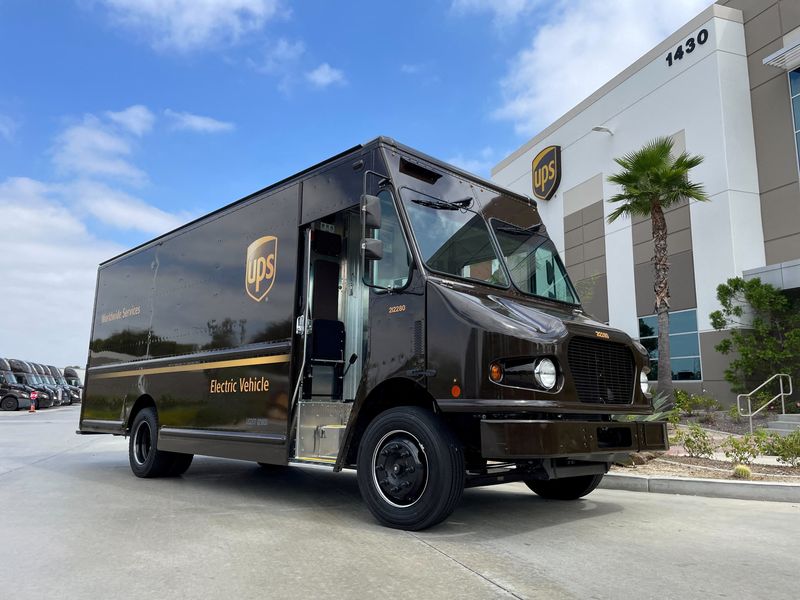By Lisa Baertlein, Abhirup Roy and Nick Carey
LOS ANGELES/SAN FRANCISCO (Reuters) -UPS and FedEx (NYSE:FDX) are facing uncertainty in U.S. supplies of big, boxy electric step vans they need to replace their gas guzzlers and make a dent in the country's climate-warming tailpipe emissions.
The path to electrification by the package delivery giants is critical to U.S. President Joe Biden's transportation climate goals. Achieving that aim, however, is hampered by battery shortages that are limiting EV supplies and keeping prices high, and by startup electric van makers that are running out of money and shutting down.
"The question is how many of those (companies) will be here in five years, 10 years?" Luke Wake, UPS's vice president of fleet maintenance and engineering, told Reuters.
In a double whammy, UPS and FedEx are also losing access to California vouchers that help defray EV prices that can be about two times higher than traditional delivery trucks.
UPS and FedEx obtained some relief from EV supply constraints when trend-setting California, the epicenter of electrification, put on hold a rule that would have required them to purchase electric delivery vehicles exclusively starting this year. An industry group whose members include UPS and FedEx has filed a lawsuit claiming that California first needed the approval of U.S. regulators.
The delivery companies and their electric van suppliers face a Catch-22 situation, said Sam Fiorani, a vice president at AutoForecast Solutions.
"You need the demand to have the supply and you need the supply to have the demand. Getting both of them to work at the same time is the problem," he said.
UPS has tested and purchased EVs for decades and is a bellwether for demand. It has more than 150,000 delivery vehicles around the globe and is among the top buyers of step vans, replacing about 7,000 of its ubiquitous brown trucks each year in the U.S. alone.
UPS and FedEx, which each have rolled out about 1,000 electric step trucks, are keeping their options open.
UPS is sticking with its plan, set in 2016, to rely on EVs and other alternative fuel vehicles to reduce emissions. Those other vehicles include 13,000 step vans that run on renewable natural gas (RNG).
FedEx told Reuters it is looking for opportunities to incorporate other lower-emission delivery trucks into its fleet.
'SUBJECT TO AVAILABILITY'
UPS and FedEx favor step vans - larger, often custom-built trucks with roomy cargo areas.
U.S. deployments of EV step vans by UPS, FedEx and others such as bread and linen carriers peaked at 275 in 2021 and fell to 238 in 2022, according to data from the nonprofit CALSTART. Those deployments were between 220 and 250 for 2023, the group estimates.
Meanwhile, delivery rival Amazon.com (NASDAQ:AMZN) already has 13,500 smaller electric cargo vans from Rivian across the U.S. and Europe - still a tiny fraction of the broader cargo van market.
UPS and FedEx say electric step vans are hard to find.
"There is limited availability for larger capacity vans," FedEx said in a statement.
In 2021, FedEx announced its goal to make 100% of pickup and delivery vehicle purchases in its company-owned Express unit electric by 2030. It sometimes adds the words "subject to availability" in statements about that goal.
UPS made a big bet on the EV transition in 2020, investing in UK-based Arrival and placing an order for 10,000 electric vans. But Arrival ran out of money before selling a single vehicle to UPS.
Arrival is not alone. Upstart (NASDAQ:UPST) EV maker Lightning eMotors is in receivership, while Workhorse and Xos have issued going-concern warnings.
Atlanta-based UPS expects to use 40% alternative fuel in its Ground operations by 2025, up from 29% currently. RNG trucks today can be more climate-friendly than EVs powered by electricity from coal and other fossil fuels, Wake said.
Environment advocates do not embrace UPS's RNG analysis, citing the tiny percentage of RNG in the natural gas supply and the risk of leaks that release methane, a heat-trapping greenhouse gas.
STICKER SHOCK
Wake said EV prices can be "cost-prohibitive," but declined to disclose how much UPS pays.
In Southern California, UPS recently dispatched new zero-emissions step vans made by long-time supplier Freightliner Custom Chassis Corp (FCCC) - owned by Daimler Truck - and SEA Electric, which is being purchased by Canada's Exro Technologies.
The cost of an FCCC MT50e electric step van is just over $260,000, according to U.S. General Services Administration documents. That is about double the cost of a traditional model, industry advisers said. Freightliner declined to comment on pricing and said "we stand ready to produce as many MT50e products as the market and our customers demand."
California for years offered purchase vouchers of $60,000 or $85,000 to all commercial buyers of electric step vans - but changed terms for large companies like UPS and FedEx in 2023.
A Reuters review found those companies now must buy 30 trucks without incentives before they are eligible for half of the value of vouchers on additional purchases. Those large-company incentives will end on Jan. 1, 2025.

As states like Oregon and Washington prepare to offer vouchers, the California incentive change could be weighing on adoption as the biggest fleets historically represent a larger percentage of new truck purchases, said CALSTART Vice President Tor Larson. If the U.S. Environmental Protection Agency clears the way for California to restrict large delivery company fleet purchases to electric and other zero-emissions vehicles, this could give the electric step van market a European-style regulatory nudge. This is because the rule could then be adopted by other U.S. states.
"The U.S. tries to use carrots. Europe does a good job of using sticks," said Scott Phillippi, a former UPS executive.